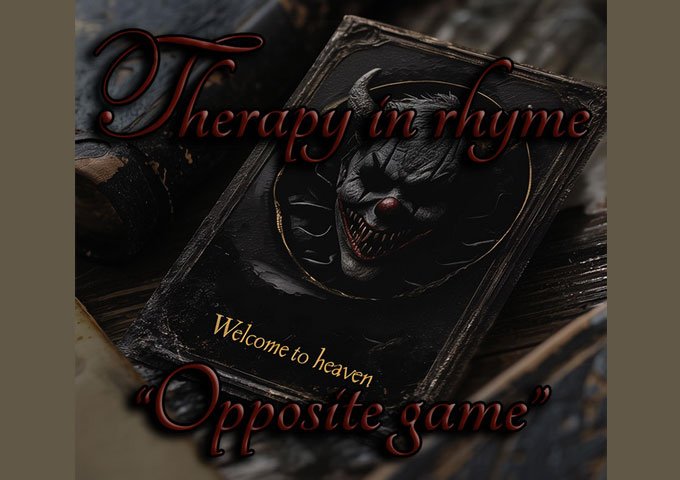In an era where political disillusionment reaches fever pitch across the globe, Norwegian composer Jan Helge Almås has crafted something extraordinary with his conceptual project Therapy in Rhyme, which emerges as a singular artistic vision to challenge the very foundations of accountability and justice. Therapy in Rhyme, the brainchild of the intrepid Jan Helge Almås, is not merely a band; it is a sonic crucible forged in the fires of personal experience and universal frustration. Their monumental trilogy album, “Tragedy in Corruption”, is an audacious journey, a sweeping orchestral narrative that transitions from the delicate grace of classical movements to the unbridled fury of heavy metal, all while meticulously dissecting the insidious traumas born from leadership failures.
Jan Helge Almås’ inspiration for this ambitious project is deeply rooted in his personal struggle to aid Ukrainian refugees within a Norwegian municipality. This deeply felt frustration, bordering on righteous anger, has become the wellspring from which “Tragedy in Corruption” flows. The album is a stark reminder that when those in power shirk their responsibilities, disregard established laws, and actively suppress investigations into misconduct, the resulting betrayal leaves an indelible scar. The narrative crescendos when, instead of offering solace or apology, these same leaders shamelessly boast of their efforts, deepening the wounds of neglect. Therapy in Rhyme asserts unequivocally that such betrayal, unacknowledged and unatoned, can never truly be forgotten or forgiven.
The sheer scope of “Tragedy in Corruption” is breathtaking, encompassing an impressive international ensemble of contributors, a testament to the global resonance of its themes. This diverse collaboration underscores the universal human experience of demanding accountability from those entrusted with power and upholding fundamental human rights. Beyond its musical prowess, “Tragedy in Corruption” stands as a potent call to action, a testament to Jan Helge’s unwavering belief in music’s capacity to ignite change. By sharing his harrowing experiences and unwavering vision, he hopes to create a ripple effect, inspiring individuals worldwide to demand better from their leadership, fostering a culture of justice and accountability.
The trilogy is meticulously structured into three distinct parts: “Tragedy in Corruption – Pt.1 “Hope””, “Tragedy in Corruption – Pt.2 “Hate””, and “Tragedy in Corruption – Pt.3 “The Tragedy””. This ambitious, 34-track odyssey fearlessly traverses a vast musical landscape, from the intricate technicality of heavy metal to the grandeur of cinematic scores, the timeless elegance of classical compositions, and even elements of pop and folk. Today, our focus narrows to a particularly visceral track from the second movement, “Tragedy in Corruption – Pt.2 “Hate””, a searing indictment titled “Opposite Game.”
“Opposite Game” thrusts the listener into a disquieting reality where honesty is a relic and broken promises are currency. It paints a chilling tableau where success is predicated on the deliberate distortion of truth, the blatant disregard for established laws, and the cynical fabrication of self-serving guidelines—all at the grievous expense of others. The cost of entry into this sinister charade is the complete forfeiture of empathy and humanity, a price willingly paid by those who volunteer to participate in this game of pure evil, where deception is not merely tolerated but celebrated.
The song’s chorus, a relentless surge of sound and sentiment, hammers home the unsettling truth that within this “opposite game,” every conceivable means is permissible in the relentless pursuit of boundless success, profit, adulation, and power. It masterfully illustrates a world consumed by insatiable greed, where individuals, blinded by avarice, become mere pawns in a self-serving charade. The lyrics convey a profound sense of entrapment, suggesting that once one sells their soul to enter this malevolent game, escape becomes an impossibility.
The verses of “Opposite Game” meticulously construct a grim social panorama, one plagued by pervasive political turmoil and shrouded in a labyrinth of hidden documents and clandestine agendas, all serving as fertile ground for the propagation of malevolence. The insatiable hunger of these “players” is palpable; their consciences dormant, they brazenly threaten to exacerbate the suffering of their victims if their demands are not met. The lyrical narrative vividly portrays a “game of betrayal,” where every conceivable tactic is employed to subvert justice, albeit with the chilling caveat that not all players possess military might to enforce their will – a subtle yet potent distinction.
Musically, “Opposite Game” is a tour de force, a compelling fusion of progressive rock’s intricate arrangements and modern metal’s raw power. The track is propelled by dynamic rhythms, searing guitar solos that ignite the soundscape, and crushing riffs that land with visceral impact. The soaring melodic lead vocals are deftly interwoven with harsh vocal passages and spoken-word sections, creating a rich tapestry of vocal expression.
The song’s epic arrangement is further enhanced by dramatic and emotionally charged orchestral embellishments, all masterfully ensconced within a powerfully layered rock production. The collaborative efforts of composer and producer, Jan Helge Almåson on keyboards and backing vocals, Rune JM Almaas on rhythm and lead guitar, bass, and engineering, Mikołaj Krzaczek contributing rhythm guitar and compositional duties, as well as Клайв Макмозок anchoring the drums, coalesce to create an undeniably potent sonic experience.
Almås’s poignant lyrics delve into the insidious nature of this “opposite game.” The opening lines immediately establish a realm where “false promises do reign,” and “masks of corruption enshroud the truth,” leading to an inevitable “chaos in the flame.” The chilling invitation to “awaken your inner narcissist and embrace the darkness within” serves as a stark warning, portending the impending “tragedy for the common man.” The imagery of “vultures dance in joy as we struggle to survive” paints a desolate picture of despair and sorrow taking hold, where “the nightmare is haunting as emotions unfold.”
The lyrical narrative continues to expose the insidious mechanisms at play, with “opposite rules, twisting like a knife,” leaving individuals “trapped in a web of political strife.” The chilling revelation of “secret documents, concealed from our eyes, with lies buried deep” underscores the insidious nature of “corruption’s rise.” The audacious claim that “half is as much as it all,” devoid of “limit or shame,” further highlights the insatiable greed at the heart of this game. The ominous threat to “do worse, alongside their grin,” feeding on “power and pain, thriving in sin,” paints a truly disturbing portrait of unchecked malevolence.
The plight of the “common man” is articulated with heart-wrenching clarity, bearing “anguish like chains,” their “sanity deemed worthless, sinking forever in drains.” Enslaved by misery, their very name is “haunted,” and in this twisted game, “the act of sanity is a shame.” The concluding lines deliver a crushing blow: “It’s game over for the common man, a tragic fate within deceit’s dark plan.” Here, happiness is a mirage, replaced by “torment and pain,” where “the words, they bleed and it’s art that stains.” It’s a powerful, almost agonizing conclusion, painting a bleak picture of a society where truth and justice are irrevocably compromised.
While the full “Tragedy in Corruption” album trilogy has yet to be officially unleashed upon the world, singles like “Opposite Game” are already available on major streaming platforms. This early release offers a tantalizing glimpse into the profound artistic statement that Therapy in Rhyme is poised to make. “Opposite Game” is a guttural scream against injustice, a meticulously crafted sonic weapon in the ongoing battle for accountability. It demands not just listening, but profound reflection, compelling us to confront the uncomfortable truths it so boldly illuminates. Prepare yourselves, for Jan Helge Almås’ Therapy in Rhyme project, which is not here to simply entertain; they are here to awaken.
OFFICIAL LINKS:
https://www.facebook.com/TherapyInRhyme/
https://open.spotify.com/artist/0llv8brHR2B4XZOdleykNg?si=X5ezEkcJS9qiXuzETeDC-g


